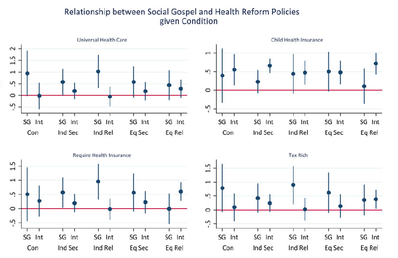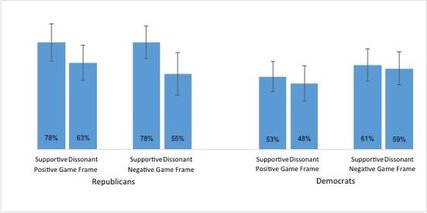Kenneth M. Miller
Information Effects
In addition to studying the supply side of political information, I am also interested in the downstream effects. I examine how different forms of political communication such as elite rhetoric, campaign advertising images, and news headlines affect attitudes and political behavior of citizens.
The Gospel of Reform: The Social Gospel and Health Care Reform Attitudes (with Eric L. McDaniel) 2018. Politics and Religion 11(2): 364-395

Most research on the social gospel, a religious interpretation that obliges people to care for the less fortunate and correct social inequalities, has focused on elite rhetoric. However, it is not clear the extent to which members of the public also adhere to this socioreligious philosophy. The moralistic tone of the 2010 health care reform debate has led many to argue that there is a revival of the social gospel. To what extent has this debate gained traction among citizens writ large? Which individuals will be most likely to be influenced by elite discourse that draws social gospel? Using two unique surveys and an experiment, we demonstrate that Social Gospel adherents have distinctive political attitudes. Specifically, they are more attentive to social policy issues and are more supportive of expanding the social safety net. Second, we demonstrate that elite rhetoric that draws from the Social Gospel tradition can influence policy preferences.
| gospel_of_health_reform.pdf |
A New Face to the Race Card? Campaigns, Racial Cues, and Candidate Credibility (with Tasha S. Philpot). 2020. Social Science Quarterly 101(1): 73-90
Most studies of racial imagery in political messaging have focused on the activation of racial prejudice. This study addresses the consequences of campaigns’ shift away from negative stereotypical images of Blacks to instead use positive, inclusive images. We expect that positive racial images can be used to improve perceptions of a candidate’s perceived level of inclusivity and have an effect on overall candidate evaluations. Using an experiment embedded in the 2014 Cooperative Congressional Election Study we find that the ability of racial images to signal the inclusivity of a candidate is determined by the candidate’s credibility on the issue, which is cued for voters by the candidate’s gender and party. In short, female Democratic candidates are most credible and thus most effective in signaling inclusivity, while male Republican candidates are least credible and least effective. Further, we find that successfully signaling racial inclusivity has potential electoral payoffs.
| new_face_to_the_race_card.pdf |
Horse Race Coverage and Selective Exposure

This study explores how the use of a game frame, or "horse race" style coverage of politics can encourage partisans to engage in selective exposure - the practice of avoiding news that is inconsistent with their political attitudes. Using a survey experiment embedded in the 2016 Cooperative Congressional Election Study, the moderating effect of game frame headline frames on partisans' propensity to avoid news stories is measured. Secondly, this study assesses if negative news frames have more powerful effects than positive news frames. Patterns of selective exposure are observed, but only among Republican respondents. When presented political news framing the story using a game frame, Republican respondents are more likely to avoid the dissonant political story than when the news carries a neutral issue frame. Furthermore, Republican respondents were more likely to avoid a story framed as bad news for Republicans than a story framed as good news for Democrats. Respondents' policy attitudes on the subject of the political news in the experiment, immigration, were not a moderating factor in these results. To the contrary, the observed patterns of selective exposure appeared to be driven by partisan identity and issue salience and not by policy attitudes.